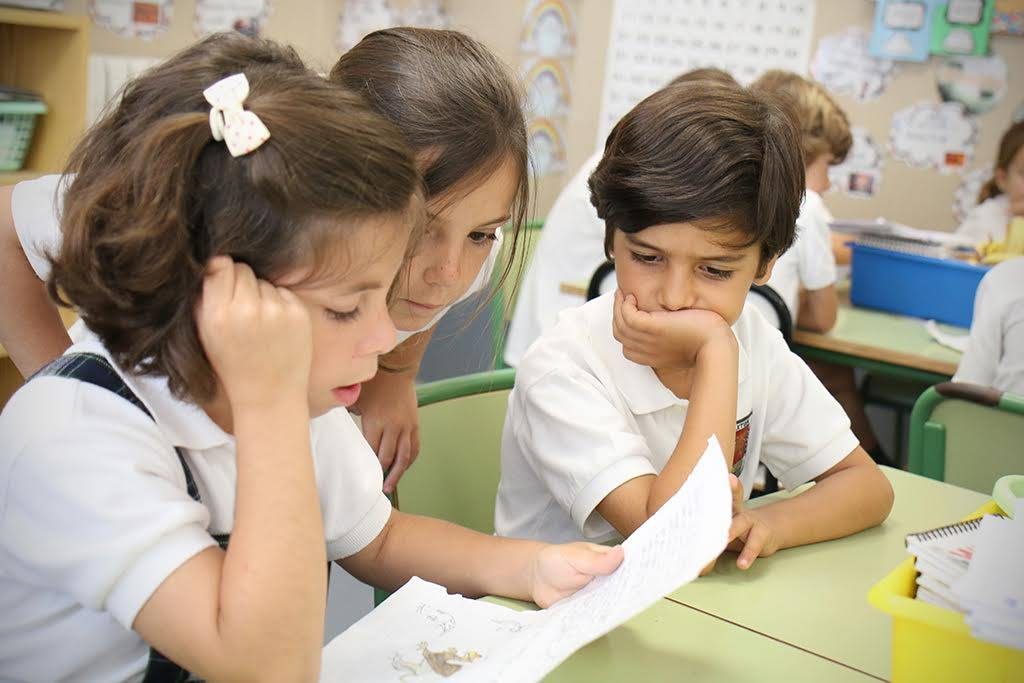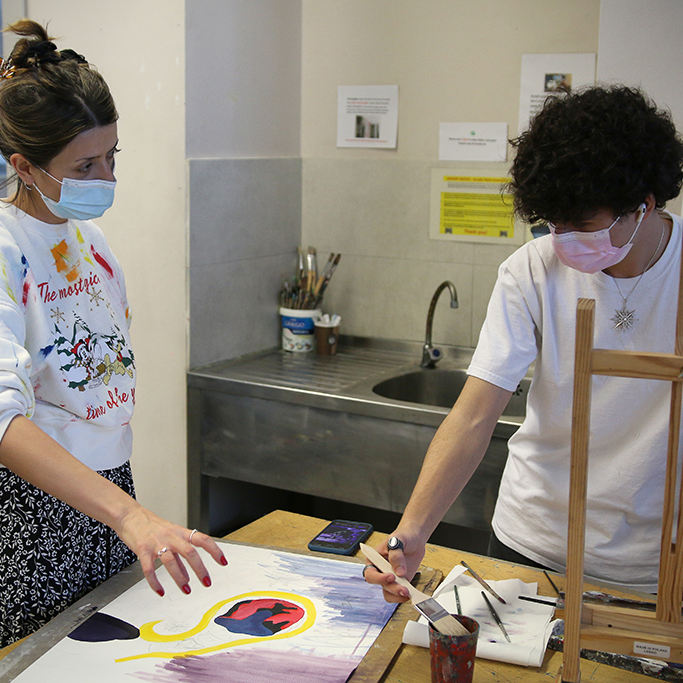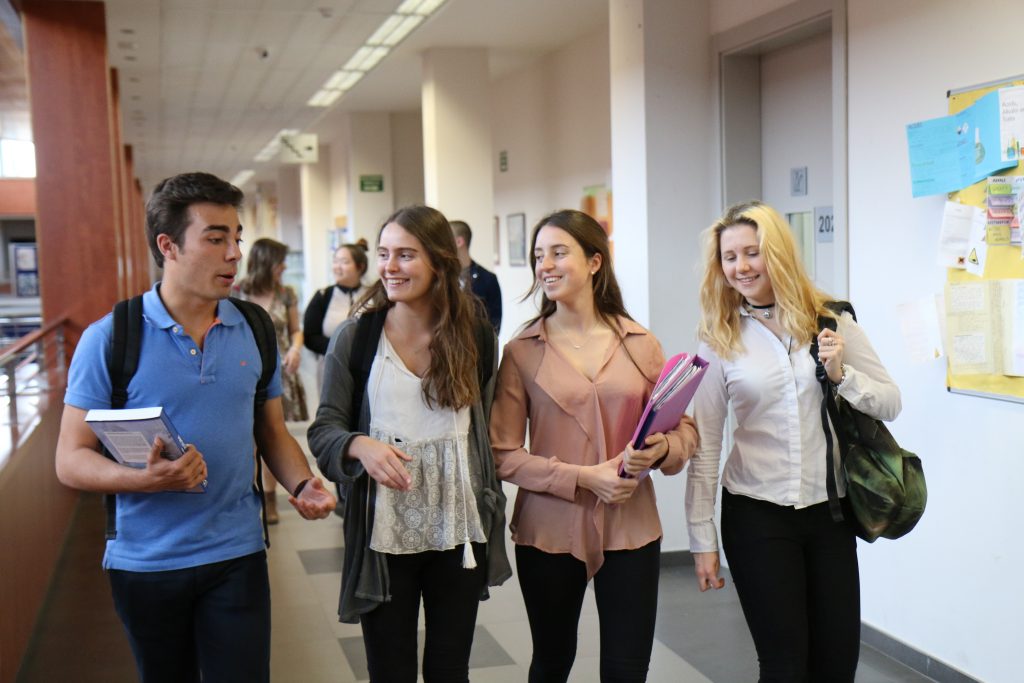
Por Belén Palacios, Coordinadora del Departamento de Español en Caxton College
La semana pasada tuve que llevar a mi hija de tres años a la pediatra por una otitis. La pediatra estuvo charlando con ella unos minutos y la felicitó por las palabras tan interesantes que había utilizado.
- ¡Que buen vocabulario tienes! Le dijo sorprendida.-
Y mi hija, que no tiene ni idea de lo que significa “vocabulario” pero en seguida se dio cuenta de que le habían echado un piropo, puso una sonrisa de oreja a oreja y contestó: -¡Gracias!
Que los niños tengan un buen vocabulario y se expresen con cierta corrección a nivel gramatical les ayuda a expresar sus ideas, sus emociones y sus necesidades. También les ayuda a estructurar mejor su pensamiento y a mejorar sus relaciones sociales.
Contado así parece un objetivo muy ambicioso, pero en realidad, no tiene ningún secreto. En casa no hacemos nada especial.
Bueno sí… les contamos cuentos.
Desde que nacieron, aunque no pudiesen procesar el significado de lo que decíamos, les hemos contado a nuestras hijas infinidad de cuentos. Gesticulando, cambiando el tono, susurrando a veces… Les hemos cantado para dormir, les hemos contado las rimas de nuestra infancia… Y nuestras hijas aprendieron en seguida a prestar atención a los cambios en el discurso, a las expresiones de nuestras caras, a la musicalidad…
Ha pasado el tiempo y ahora son ellas las que piden un cuento cada noche. Con todos los beneficios que ello conlleva y que son conocidos por todos.
Nuestro último descubrimiento han sido los audio-cuentos.
Siempre les hemos contado cuentos en el coche camino del cole. Algunos populares, otros inventados porque querían ser ellas las protagonistas…
Un día, por casualidad, les pusimos un CD que teníamos por casa. No solo estaban los cuentos de toda la vida, los que nos vienen a la mente cuando nos piden un cuento, sino que había cantidad de cancioncillas, rimas, y cuentos cortos que nosotros no conocíamos o que habíamos olvidado ya… y que nos sacaron de la monotonía, aportándonos una variedad inesperada y muy apreciada por nuestras hijas y por nosotros mismos.
En seguida nos dimos cuenta de su potencial.
Escuchar cuentos en la radio…
- Expone a los niños a un nivel de lectura al que no podrían acceder por sí mismos, subiendo su capacidad de procesar los textos de forma considerable y ampliando su vocabulario y sus recursos estilísticos.
- Entrena la atención.
- Desarrolla la escucha crítica.
- Estimula su imaginación puesto que ellos crean su propio imaginario en torno a lo que van escuchando.
- Supone una ocasión excelente para conversar con nosotros sobre temas que nos importan o que nos preocupan.
- Desarrolla la comprensión.
- Establece vínculos entre padres e hijos.
Por estos y otros motivos, hemos decidido ampliar nuestro repertorio de cuentos y pedir algunos CD´s nuevos a los Reyes Magos este año.
Es una experiencia que disfrutamos todos, incluso tenemos un listado con los que nos gustan más y los que no nos gustan tanto.
Eso sí, de vez en cuando, las niñas nos piden que apaguemos la radio y que esos mismos cuentos… ¡se los contemos nosotros!
Felices fiestas.
By Belén Palacios, Primary Spanish Department Co-ordinator at Caxton College
Last week I had to take my daughter, aged three, to the paediatrician for an ear infection. The paediatrician chatted with my daughter for a few minutes and congratulated her for the interesting choice of words she had used.
‘What a good vocabulary you have!’ she said with surprise.
And my daughter, who has no idea what the word ‘vocabulary’ means, realised right away that she was being complimented. So she smiled from ear to ear and answered, ‘Thank you!’
If children have a good vocabulary and are able to use mostly correct grammar, it is easier for them to express their ideas, emotions and needs. It also helps them to structure their thoughts better and to improve their relationships with others.
Stated this way, it sounds like a very ambitious goal, but it’s not really that difficult. We don’t do anything special at home.
But we do tell them stories.
Ever since they were born, even though they couldn’t understand what we were saying at the time, we have told our daughters stories. We use gestures, change our tone of voice, and even whisper. We sing to them and recite nursery rhymes from our own childhood. And our daughters learnt right away to pay attention to changes in our speech, our facial expressions and intonation.
As time has gone by, now they are the ones who ask us to read to them each night (with all of the benefits that we know this can bring).
Our latest discovery is audiobooks.
We’ve always told them stories in the car on the way to school: some traditional ones, and others that we made up because the girls wanted to be the main characters!
One day, by chance, we put on a CD that we had around the house. It didn’t have just the usual stories—the ones that first come to mind when they ask us to tell them a story—but also songs, nursery rhymes and short stories that we didn’t know or that we’d forgotten. With the CD, we broke the monotony–discovering an unexpected variety–to the delight of both our daughters and ourselves.
Immediately, we realised the potential.
Listening to stories on the radio:
- Exposes children to a level of reading that they cannot reach on their own, raising their ability to comprehend texts considerably and broadening their vocabulary and stylistic resources.
- Improves their attention span.
- Develops their critical listening skills.
- Stimulates their imagination, since they create their own images in their minds as they listen.
- Is an excellent opportunity to talk to us about anything that is important to them or that they are worried about.
- Develops their listening comprehension skills.
- Strengthens the parent-child bond.
For all of these reasons and more, we’ve decided to add to our repertory of stories, and ask Santa Claus to bring some new CDs this year.
It’s an experience that we all enjoy, and we even have a list of the stories we like the most and the ones we don’t like as much.
It is true that sometimes the girls ask us to turn off the radio, and instead, for us to tell them those same stories!
Happy holidays.



















